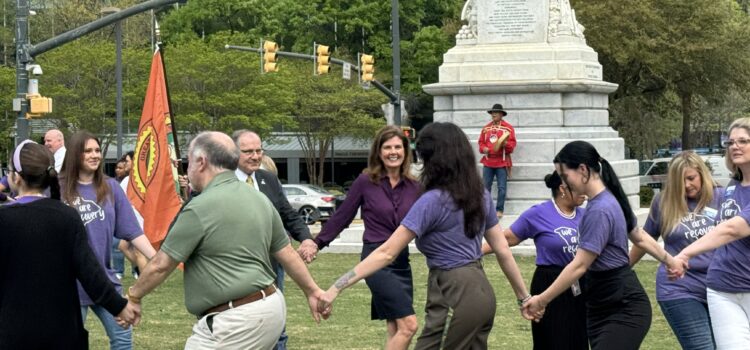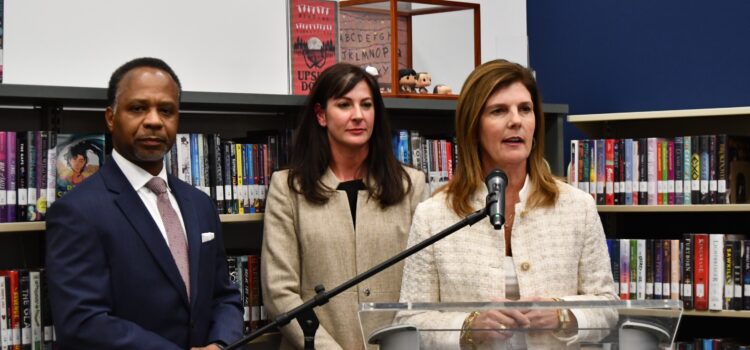By Lauren Larsen | Apr 4, 2024, Carolina News & Reporter
USC senior Hunter Welch said dropping out of college to get treatment for substance abuse was extremely difficult. But looking back, he is grateful.
“That was, at the time, probably the most devastating moment in my life, because I felt like I was admitting that I could not do this,” Welch said. “And now I see it as the key to the life I have today.”
Gamecock Recovery hosted the state’s second annual collegiate recovery day event Tuesday to support students in recovery from substance abuse.
Students and staff from across South Carolina gathered at the Statehouse for the awareness event.
After straying away from the recovery community, Welch said he did a lot of self-exploration but realized how much recovery was a part of his identity.
“I found so much home and acceptance in the recovery community,” Welch said. “I didn’t realize how important it was until I lost it.”
Raylyn Garner, a graduate assistant for Gamecock Recovery, stressed the importance of government officials to advocate and support recovery.
S.C. Lt. Gov. Pamela Evette read a proclamation signed by Gov. Henry McMaster declaring April 15, 2024, as Collegiate Recovery Day throughout the state.
“Collegiate Recovery Day provides an opportunity to increase awareness and understanding of substance use disorders and to show respect and support for those in recovery, as well as those who have helped them obtain recovery this day and throughout the year,” Evette said.
Garner said data shows that 5% of college students identify as being in recovery. That turns out to be a lot of students at a large school like USC.
“Today, we can ensure that the message of recovery is loud and clear, a message that says you’re not alone, you’re supported and your journey matters, ” Garner said.
Recovery communities and organizations on campuses enhance students’ overall physical and emotional well being, Evette said.
Ten colleges in the state were in attendance and had students in recovery speak. Representatives from S.C. Department of Alcohol and Other Drug Abuse Services (DAODAS), Lutheran Services Carolina and the Catawba Tribe also attended.
Since the recovery day celebration last year, S.C. State University and Columbia College have added Collegiate Recovery Programs.
Wood Marchant, director of the College of Charleston’s program, said that when he graduated college almost 30 years ago, he wouldn’t believe he was back on campus running a program for sober college students. But he finds the experience rewarding for both him and others.
“The journeys the students go on to get to graduation are incredibly inspirational,” Marchant said. “And I get a front-row seat to see people who have totally and completely changed their lives.”
Students from different universities also shared their stories.
Clemson senior Joe Ogg thought college was about partying, drugs and alcohol. But they began to consume his life, he said. For a while, it seemed like his peers were having the same experience, and it took him a while to accept they weren’t.
After rehab, Alcoholics Anonymous meetings and sober living, he was scared of going back to college and not having a place to fit in.
“Going into the (on-campus) meeting and looking around and seeing a room of college students that were having the same experience as me was monumental for me, sustaining my sobriety,” Ogg said.
Allen University senior Marvin Williams said being able to attend a university with the Collegiate Recovery Program has given him and his peers a place to express themselves without judgment or feeling alone. He said the program has given him a sense of belonging and support in his college community.
Gavrielle Jacobson, an intern for Gamecock Recovery and first-year graduate student, thanked faculty, staff and administrators who run these programs for helping students in their recovery journey.
“Their dedication to this cause not only transforms the lives of students but also contributes to the overall well- being and success of our campus communities,” Jacobson said.
Aimee Hourigan, director of substance abuse prevention and education at USC, said she wants people to know that recovery is fun and makes life better. And she said there are different ways to figure out what works for you.
Speakers at the event repeatedly expressed the resilience it takes to be in recovery and why it’s worth celebrating.
“Collectively, we are building more resilient individuals, more resilient communities … and a more resilient and strong South Carolina,” said Sara Goldsby, Director of DAODAS. “It’s something to honor and something to celebrate as we shift culture in this state to recognize and celebrate the power of recovery.”

